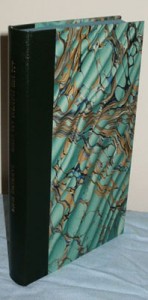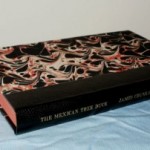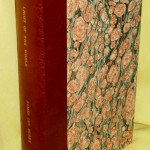Lawrence Block, All the Flowers are Dying
£65.00
Lawrence Block is a Grand Master and living legend of American crime fiction. This one of his Matt Scudder detective novels – perhaps the hardest hitting and longest running series of recent times. Block is widely admired by other writers – not just because he has bee around a long time, but his books dazzling pieces of work. This one of only 90 numbered and signed copies in a special binding with an appreciation by British crime writer Simon Kernick.
In Stock: 8 available

 Lawrence Block has been, and continues to be, the most industrious purveyor of a wide range of American crime fiction; from comic to the tragic, the ridiculous to the sublime, light-hearted to the most serious of subjects – it is all in his range. Block is the one the others point to as the master craftsman of the genre. With a shelf full of awards (including four Edgars, four Shamus Awards, two Maltese Falcon Awards, the Nero Wolfe Award, and Grandmaster status from the Mystery Writers of America, and the Cartier Diamond Dagger from the Crime Writers’ Association of the United Kingdom), he is the one others point to as the master craftsman of the genre. Compulsive plots, deft characterisation and dialogue the zing’s; this Matt Scudder detective novel is no exception. A good deal of it alternates back and forth between Scudder and his adversary. He investigates an online lover of an acquaintance and another plotline is and about a criminal who ingeniously framed another guy. However, the main attraction is in Scudder’s character and what he learns about himself. He is with this 16th outing getting on as they say.
Lawrence Block has been, and continues to be, the most industrious purveyor of a wide range of American crime fiction; from comic to the tragic, the ridiculous to the sublime, light-hearted to the most serious of subjects – it is all in his range. Block is the one the others point to as the master craftsman of the genre. With a shelf full of awards (including four Edgars, four Shamus Awards, two Maltese Falcon Awards, the Nero Wolfe Award, and Grandmaster status from the Mystery Writers of America, and the Cartier Diamond Dagger from the Crime Writers’ Association of the United Kingdom), he is the one others point to as the master craftsman of the genre. Compulsive plots, deft characterisation and dialogue the zing’s; this Matt Scudder detective novel is no exception. A good deal of it alternates back and forth between Scudder and his adversary. He investigates an online lover of an acquaintance and another plotline is and about a criminal who ingeniously framed another guy. However, the main attraction is in Scudder’s character and what he learns about himself. He is with this 16th outing getting on as they say.
Plotline: “A man in a Virginia prison awaits execution for three hideous murders he swears, in the face of irrefutable evidence, he did not commit. A psychologist who claims to believe the convict spends hours with the man in his death row cell, and ultimately watches in the gallery as the lethal injection is administered. His work completed, the psychologist heads back to New York City to attend to unfinished business.” eanwhile, Matthew Scudder has just agreed to investigate the ostensibly suspicious online lover of an acquaintance. It seems simple enough. At first. But when people start dying and the victims are increasingly closer to home, it becomes clear that a vicious killer is at work. And the final targets may be Matt and Elaine Scudder.
A Lawrence Block story appeared in the anthology No Alibi and he did an appreciation of Ian Rankin for the short story collection Beggars Banquet. Two other Block books were issued in Scorpion Press editions but have sold out. They are The Burglar in the Library with a James Sallis appreciation and Hope to Die with an extensive appreciation of the Matt Scudder series by Peter Straub. All The Flowers are Dying was issued in 2005 with an appreciation by British crime writer Simon Kernick.
| USA Price | USA price $150 |
|---|

 James Crumley, The Mexican Tree Duck
James Crumley, The Mexican Tree Duck
 James Lee Burke, Light of the World
James Lee Burke, Light of the World

Rating by “Milwaukee Sentinel” on April 1, 2012 :
“Block’s extraordinary skill as a writer is evident in the way he brings together the different parts of his plot into one electrifying whole. He spins his story with such cunning ability that you can’t help being drawn into his web. The suspense is acute enough to make you hold your breath. Combine that with a hero for the ages and a villain to match, and Block has given us yet another triumphant entry in this fine and memorable series” – Milwaukee Sentinel
Rating by Simon Kernick on May 27, 2012 :
Extract from the Appreciation by Simon Kernick
“For close to thirty years now, unlicensed New York PI, Matt Scudder, has been pounding Manhatten’s mean and unforgiving streets, visiting the bars, the tenement blocks, the places the tourists never see, as he’s worked to solve a succession of mysteries that have spanned a total of WHATEVER books and counting.
What makes Scudder so durable as a character is his complexity. Even those who like him have to admit that he’s no angel. A reformed alcoholic and ex-cop, he left the Force and his wife and family behind after an attempt to stop a stick-up in a bar ended with him accidentally shooting and killing a seven-year old girl. He’d been off-duty at the time and drinking in the bar that was held up. Had he not been drinking, would Estrellita Rivera still be alive? It’s a question you imagine Scudder asking himself countless times down the years, and is one of his many ambiguities. Some of his best friends are ruthless criminals. Take Mick Ballou, the Irish gangster, for whom murder is little more than a method of conducting business by ‘other’ means. Some of his clients are little better. In A Time to Murder and Create, Scudder is hired, literally from beyond the grave, to find the killer of an old acquaintance who also happened to be a professional blackmailer. In A Walk Among the Tombstones’, the man he’s working for is a major drug importer whose wife’s been kidnapped. At no point in the book, does Scudder judge him. He simply does what he’s paid to do. And yet we feel that he is instinctively on the side of right; that he is a good man operating in the type of harsh netherworld where good men are increasingly hard to find. Like all the best PI s, he’s dogged in his search for the truth, and he won’t give up until he’s brought those responsible for the crimes he’s investigating to justice, even if that justice means, in some cases, death at his hand. Not surprisingly, there is a melancholy about him, and that’s reflected in his quiet tones and guarded speech. He rarely raises his voice, and his laughter seems less frequent than a man should expect in life, but his dialogue, and the dialogue of those around him, crackles with a tightness and underlying sardonic humour that recall Hammett and Chandler at their best. This is how a doctor describes a conversation with a patient in 1992’s A Dance at The Slaughterhouse: “ ‘I been shot before, doc,’ he tells me. ‘Well, my boy’, I said, ‘will you never learn to duck?’”
It’s a great line, and you can just imagine the guy saying it. And that’s the thing. There’s an authenticity within these books that’s brought out by Lawrence Block’s understated yet hugely atmospheric writing style. It’s as if they’ve been plucked straight from the streets where the stories take place. Where nothing is black and white, and where cases are wrapped up, but never in a neat or sanitised manner. This is the real thing . . .